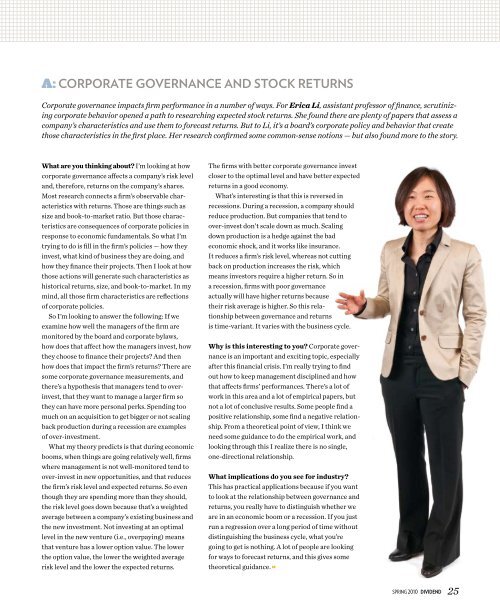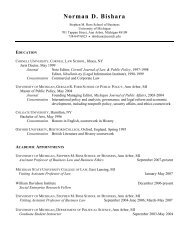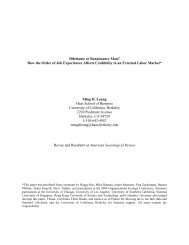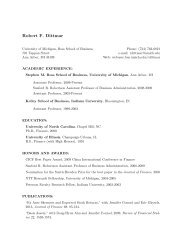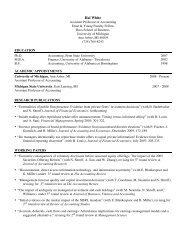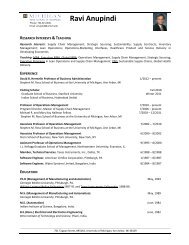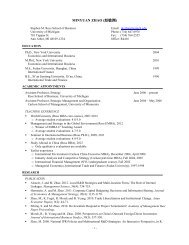DIvIDEnD - Stephen M. Ross School of Business - University of ...
DIvIDEnD - Stephen M. Ross School of Business - University of ...
DIvIDEnD - Stephen M. Ross School of Business - University of ...
Create successful ePaper yourself
Turn your PDF publications into a flip-book with our unique Google optimized e-Paper software.
A: coRPoRATE GoVERnAncE AnD STocK RETURnS<br />
Corporate governance impacts firm performance in a number <strong>of</strong> ways. For Erica Li, assistant pr<strong>of</strong>essor <strong>of</strong> finance, scrutinizing<br />
corporate behavior opened a path to researching expected stock returns. She found there are plenty <strong>of</strong> papers that assess a<br />
company’s characteristics and use them to forecast returns. But to Li, it’s a board’s corporate policy and behavior that create<br />
those characteristics in the first place. Her research confirmed some common-sense notions — but also found more to the story.<br />
What are you thinking about? i’m looking at how<br />
corporate governance affects a company’s risk level<br />
and, therefore, returns on the company’s shares.<br />
most research connects a firm’s observable characteristics<br />
with returns. those are things such as<br />
size and book-to-market ratio. But those characteristics<br />
are consequences <strong>of</strong> corporate policies in<br />
response to economic fundamentals. so what i’m<br />
trying to do is fill in the firm’s policies — how they<br />
invest, what kind <strong>of</strong> business they are doing, and<br />
how they finance their projects. then i look at how<br />
those actions will generate such characteristics as<br />
historical returns, size, and book-to-market. in my<br />
mind, all those firm characteristics are reflections<br />
<strong>of</strong> corporate policies.<br />
so i’m looking to answer the following: if we<br />
examine how well the managers <strong>of</strong> the firm are<br />
monitored by the board and corporate bylaws,<br />
how does that affect how the managers invest, how<br />
they choose to finance their projects? and then<br />
how does that impact the firm’s returns? there are<br />
some corporate governance measurements, and<br />
there’s a hypothesis that managers tend to over-<br />
invest, that they want to manage a larger firm so<br />
they can have more personal perks. spending too<br />
much on an acquisition to get bigger or not scaling<br />
back production during a recession are examples<br />
<strong>of</strong> over-investment.<br />
what my theory predicts is that during economic<br />
booms, when things are going relatively well, firms<br />
where management is not well-monitored tend to<br />
over-invest in new opportunities, and that reduces<br />
the firm’s risk level and expected returns. so even<br />
though they are spending more than they should,<br />
the risk level goes down because that’s a weighted<br />
average between a company’s existing business and<br />
the new investment. not investing at an optimal<br />
level in the new venture (i.e., overpaying) means<br />
that venture has a lower option value. the lower<br />
the option value, the lower the weighted average<br />
risk level and the lower the expected returns.<br />
the firms with better corporate governance invest<br />
closer to the optimal level and have better expected<br />
returns in a good economy.<br />
what’s interesting is that this is reversed in<br />
recessions. During a recession, a company should<br />
reduce production. But companies that tend to<br />
over-invest don’t scale down as much. scaling<br />
down production is a hedge against the bad<br />
economic shock, and it works like insurance.<br />
it reduces a firm’s risk level, whereas not cutting<br />
back on production increases the risk, which<br />
means investors require a higher return. so in<br />
a recession, firms with poor governance<br />
actually will have higher returns because<br />
their risk average is higher. so this relationship<br />
between governance and returns<br />
is time-variant. it varies with the business cycle.<br />
Why is this interesting to you? corporate governance<br />
is an important and exciting topic, especially<br />
after this financial crisis. i’m really trying to find<br />
out how to keep management disciplined and how<br />
that affects firms’ performances. there’s a lot <strong>of</strong><br />
work in this area and a lot <strong>of</strong> empirical papers, but<br />
not a lot <strong>of</strong> conclusive results. some people find a<br />
positive relationship, some find a negative relationship.<br />
from a theoretical point <strong>of</strong> view, i think we<br />
need some guidance to do the empirical work, and<br />
looking through this i realize there is no single,<br />
one-directional relationship.<br />
What implications do you see for industry?<br />
this has practical applications because if you want<br />
to look at the relationship between governance and<br />
returns, you really have to distinguish whether we<br />
are in an economic boom or a recession. if you just<br />
run a regression over a long period <strong>of</strong> time without<br />
distinguishing the business cycle, what you’re<br />
going to get is nothing. a lot <strong>of</strong> people are looking<br />
for ways to forecast returns, and this gives some<br />
theoretical guidance.<br />
spring 2010 <strong>DIvIDEnD</strong> 25


